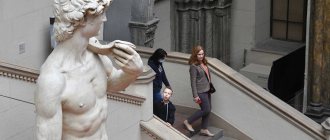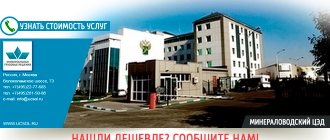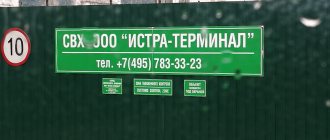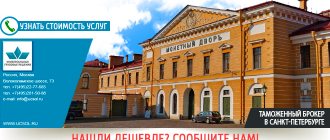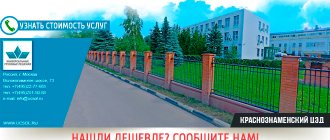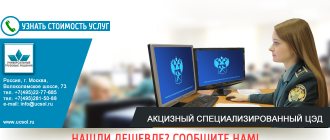Customs clearance at the temporary storage warehouse of Premier Finance LLC
Our company “Universal Cargo Solutions” provides the services of an official customs representative - a customs broker. We carry out professional customs clearance of clothing, shoes, furniture, household chemicals, electronic equipment and household appliances, stationery, toys, sports equipment and other goods and personal belongings of citizens at the Premier Finance temporary storage warehouse - Kiev customs post.
We work with all participants in foreign trade activities:
- Individuals
- Legal entities
- Individual entrepreneurs
Our FCS certificates on inclusion in the register of customs representatives (brokers)
Prices for declaration services at other customs posts in the Moscow region
Additional logistics and related services:
1. International forwarding and transport. 2. Outsourcing of foreign trade activities (providing a technical importer, supplying a broker contract, foreign trade agent). 3. Registration of permits for the supplied products: - certificate of state registration (SGR); — declaration of conformity (DC); — certificate of conformity (CC); — certificate of compliance with the requirements of technical regulations (CCTR); — import quarantine permit (IQR); — certificate of origin of products (ST-1, form A). 4. Cargo insurance. 5. Legal protection and litigation on customs issues.
Write about the required services and a representative of the customs Broker will contact you to clarify all the details of the order
to write a message
Kiev customs post, OTOiTK No. 2, Moscow regional customs, code 10013072
Address: 143090, Moscow region, Krasnoznamensk, st. Birch alley, 5 Telephone, 276-13-62, 276-13-63, 276-13-93 Working hours (schedule): daily 09.00-24.00 seven days a week
Temporary storage warehouses (TSW) in the region of operation of TP Kyiv, OTOiTK No. 2:
JSC "OST - Terminal" Address: 143090, Moscow region, Krasnoznamensk, st. Birch alley, 1/2 Phone (broker)
Our services:
- Free consultations;
- Preparation of documents for submission to the customs authority;
- Customs clearance using an electronic digital signature (EDS) of the customs representative;
- Determination of product code;
- Professional and prompt execution of customs declarations in any customs procedures;
- Preliminary calculation and payment of customs duties on behalf of the client;
- Prompt “customs clearance” and “customs clearance” of goods;
- Assistance in obtaining permit certificates;
- Customs clearance of personal belongings of citizens during international moves for permanent residence;
- And many others.
Questions and answers
Dear users!
Please note that only frequently asked questions will be published on this page for your convenience.
Is it possible to file a complaint about the work of the service located in the center through the public services center?
Answer:
We accept requests and feedback regarding the work of services located in public service centers and forward them to the management of the relevant department as a matter of routine. To formally apply and receive a response, you must contact the appropriate authority.
Where can I leave my feedback, suggestions and wishes regarding the work of the offices?
- on the official website in the “Questions and Answers” section;
- in the book of reviews and suggestions, which is located in each public service center;
- by email: [email protected]
To receive an official response on the institution’s letterhead you must:
- draw up a written appeal addressed to the director of the State Budgetary Institution MFC of the city of Moscow, sending it to the address: 125009, Moscow, Voznesensky lane. 22 / personally leaving it in the mailbox for the State Budgetary Institution MFC of the city of Moscow at the address Moscow, Voznesensky per. d. 22 / leaving at any public services center;
- leave a request in the “Electronic Reception” section on the official website;
- send an appeal through the electronic reception of the Moscow City Hall;
- leave a request using the “Our City” portal.
How to apply for a student/pupil social card, who has the right to it and what to do if it is lost?
Answer:
All citizens of the Russian Federation who are studying full-time in undergraduate educational programs, specialty programs, master's programs, and residency programs in educational organizations of higher education can apply for a student social card. To do this, you must submit an electronic application through the Mos.ru portal.
A ready-made social card can be obtained at any “My Documents” government service center in Moscow, specified when filling out an electronic application.
All citizens of the Russian Federation who are studying full-time in state educational organizations of the city of Moscow, subordinate to the executive authorities of the city of Moscow, in educational programs of primary general, basic general, secondary general, secondary vocational education that have state accreditation, can apply for a student’s social card.
To do this, you must submit an electronic application through the Mos.ru portal. A ready-made social card is obtained from an educational organization.
Students studying in state educational organizations that are not subordinate to the executive authorities of the city of Moscow, municipal or private educational organizations in educational programs of primary general, basic general, secondary general education, secondary vocational education that have state accreditation, as well as foreign students - submit an application for the issuance of social security student cards in any public service center “My Documents” in Moscow;
Foreign citizens, stateless persons studying full-time in undergraduate educational programs, specialty programs, master's programs, residency programs in educational organizations of higher education, submit an application for the issuance of a student social card at any government service “My Documents” in the city of Moscow.
The list of required documents can be clarified by calling the Unified Information Service of the city of Moscow: 8 (495) 777-77-77.
If a student's Social Card is lost, you must inform the State Unitary Enterprise MSR by calling the hotline 8 (495) 539 55 55, as well as OJSC Bank of Moscow by calling the Customer Support Service (24 hours a day, seven days a week). Upon receipt of such a notification, Bank of Moscow OJSC will block the payment application on the card and save the money (temporary blocking period is 3 days).
After this, you need to contact the “My Documents” government services center to submit an application for the production of a new Social Card. Bring your passport, student ID/school certificate with you.
The production of a student’s social card takes no more than 30 calendar days.
I paid the rent by mistake twice this month, will this overpayment be credited to me next month?
Answer:
Funds paid twice will definitely be taken into account. If there is no debt on payment for housing and communal services on the personal account, the overpayment will be taken into account in the next period.
Do government service centers provide assistance to people with hearing disabilities?
Answer:
An online sign language translation service is available in all government service centers, which allows hearing-impaired visitors to receive all government services from any specialist with the usual comfort. Experienced Russian Sign Language translators provide online support to people with hearing disabilities who contact the capital’s public service centers. Each visitor can receive the necessary service by contacting the dispatcher, who simultaneously translates into Russian sign language using a tablet laptop.
Where can I get information about vacancies at public service centers?
Answer:
Dear applicants!
Centers for the provision of public services in the city of Moscow “My Documents” are working to form a personnel reserve of candidates for work in public service centers in Moscow districts. Consideration of candidates from the formed personnel reserve is carried out when vacancies appear in the State Budgetary Institution MFC of Moscow.
To send your resume, use the email address - You can also fill out the form in the “Vacancies and Internship” section.
Additionally, we inform you that you can fill out a candidate application form for inclusion in the personnel reserve at any public service center in Moscow.
Do public service centers operate only on a territorial basis or can you contact any convenient one?
Answer:
All services can now be obtained at any Moscow public service center convenient for you, with the exception of three:
- Registration of citizens of the Russian Federation at the place of stay and place of residence within the Russian Federation (in terms of receiving and issuing documents on registration and deregistration of citizens of the Russian Federation at the place of stay and place of residence within the Russian Federation);
- Registration and issuance of invitations to enter the Russian Federation for foreign citizens and stateless persons;
- Carrying out migration registration of foreign citizens and stateless persons in the Russian Federation (in terms of receiving notification of the arrival of a foreign citizen or stateless person at the place of stay and putting a mark on acceptance of the notification).
What are the terms for providing services?
Answer:
You can obtain information about the timing of receiving a particular service by calling the Unified Information Service of the city of Moscow. There is also a notification system about the readiness of documents: when receiving at the center, leave your contact information and come for documents after receiving a notification by email or SMS.
How to get the service, and what documents are needed for this?
Answer:
You can find out all the information about the procedure for obtaining services and the completeness of documents by calling the Unified Information Service of the city of Moscow. For your convenience, when planning a visit to the public services center, you can look at the official website of the Moscow Mayor to see the number of people in line for a particular service and select the least busy center for processing documents.
How to call the public services center?
Answer:
For this purpose, the Unified Information Service of the city of Moscow operates, where you can clarify the information of interest.
What are the working hours for public service centers?
Answer:
All public service centers in Moscow are open from Monday to Sunday from 8:00 to 20:00, flagship offices - from 10:00 to 22:00. Please note that the operating hours of other departments located in our centers may vary. You can get acquainted with it on the Official website of the Mayor and the Government of Moscow, as well as by calling the Unified Information Service of the city of Moscow.
Terms and cost of customs clearance of goods at the temporary storage warehouse Premier Finance - t/p Kyiv
The deadline for registration at the Premier Finance temporary storage warehouse is within a day!
The price or cost of customs clearance of goods at the Premier Finance temporary storage warehouse is the minimum in the market. The final cost depends on the volume of tasks set by the client, as well as the type of customs procedure. Average values can vary from 3,000 to 25,000 rubles, depending on the client’s status as a foreign trade participant. The period for goods clearance is also minimal; it varies from several hours to one day, regardless of the type, type and quantity of goods being declared.
We are ready to become your reliable partner at customs!
Kiev "MKAD" - a bottomless feeding trough for Zelensky's entourage
The construction of a large ring road around Kyiv, included in the “Big Construction” state program, is a scheme for the theft of millions of dollars by Vladimir Zelensky’s entourage, the equivalent of which has never existed in Ukraine before. This is stated by Ukrainian political scientist Vyacheslav Chechilo.
“Last week Ukravtodor launched the first tender to select a contractor. Now we are talking about the first section with a length of 18 km with an expected price... 5.35 billion UAH. This cost is incredible not only for Ukraine - 300 million hryvnia per kilometer ($ 11.2 million at the current exchange rate). Just a year ago, Ukravtodor itself said that the normal price for building new roads in Ukraine is UAH 170 million. And now they have made the construction of the capital’s road more expensive than in the USA, Canada, Germany and China,” Chechilo writes on his Facebook.
The first stage of the construction of the Kyiv "MKAD" is the creation of its southern circle, which would correspond to similar highways in the capitals of developed countries of the world. Geographically, the southern circle runs from the routes to Zhytomyr and Transcarpathia in the west to the entrance to the Boryspil international airport and the route to Chernigov in the east. In the conditional middle of this circle (the extreme south of the Kyiv ring road) there are interchanges leading to highways to Odessa and Kharkov. The 18.1 km section that Chechilo is talking about is the “zero kilometer” zone on the western outskirts of Kyiv, located between the Kyiv-Kovel and Kyiv-Zhitomir highways. Only the roadway will be built here.
Taking into account that one kilometer of such a roadbed costs $11.2 million, the total estimate for the section will be about $203 million. The next section, between the highways to Zhitomir and Odessa, is 35.2 km. With the calculation that one kilometer of this semicircle will cost $11.2 million, the estimate for this section is $394.24 million. It turns out that more than half a billion dollars will be spent on just over 53 kilometers. The remainder of the Kyiv MKAD is 96.5 km. If you multiply this distance by the project cost of one kilometer, it comes out to more than one billion dollars.
Total: the cost of the Kyiv ring road is about one and a half billion dollars only at design and estimate prices. For comparison: the much more technologically complex system of the Moscow Central Circle, where commuter electric trains are connected to the Moscow Metro, was estimated to cost the Moscow City Hall more than $340 million. The master plan of the Kiev MKAD does not contain anything similar to the know-how of the Moscow megasubway. According to the Kyiv general plan, it is only necessary to lay highways, create convenient interchanges, and build a bridge for cars across a narrow section of the Dnieper River.
The fact that technologically simple road work in Kyiv is more expensive than modern highways in developed European countries is explained by the unprecedented overestimation of the real cost of work on the Kiev MKAD. In reality, they will spend pennies on the work itself, and steal the rest. Almost one and a half billion dollars is just the project cost; when the project is launched, its participants will demand much more money, which means that they will steal much more.
The grandiose road cutting around Kyiv is a “corporate project” of the leadership of the Servant of the People party, explains Vyacheslav Chechilo:
“To develop such an incredible margin, the entire vertical of power was involved. “Servants” passed through the Rada a law to exclude procurement for the Great Ring Road from the scope of the Law “On Public Procurement” and, accordingly, to remove these tenders from the “Prozorro” system. Then the Cabinet of Ministers adopted a resolution on an “experimental project” to develop billions on the Big Circle. So no one has any way to check how and what is happening at the tender for the Big Circle. Was that even possible? Can!"
To conduct top-regulated bidding with pre-agreed results, a one-day platform called Playtender was created. The owner of Playtender is Vyacheslav Suprunenko , former son-in-law of the ex-mayor of Kiev Leonid Chernovetsky . Chernovetsky, aka Lenya Cosmos , is familiar to Kiev residents from his friendly ties with American religious sectarians. Euromaidan saved Vyacheslav Suprunenko and his brother Alexander from criminal prosecution for corruption, and allowed Vyacheslav Suprunenko to return to Ukraine from exile abroad in 2011.
The corruption scheme of Vyacheslav and Alexander Suprunenko in the Kyiv City Council during the presidency of Viktor Yanukovych. Illustration: Livejournal
During the presidency of Vladimir Zelensky, Suprunenko is experiencing his economic takeoff.
The European Bank for Reconstruction and Development (EBRD), which provides tranches for the modernization of Ukraine’s transport network, turns a blind eye to this mafia panama, reports the Ukrainian business publication “Nashi Groshi”.
“Just a year ago, the EBRD demanded that the current Minister of Infrastructure of Ukraine, Alexander Kubrakov , expel from international tenders a group of Ukrdorinvest managers involved in falsifying a tender for the repair of the Kiev-Odessa highway using EBRD funds. Then, among those expelled was the director of Ukrdorinvest, Elena Krivoruchko . A year passed and Kubrakov made Krivoruchko the head of the State Agency for Infrastructure Projects (Ukrinfraproekt), through which billions of dollars pass for the repair of airports, road junctions and other financially profitable contracts in Ukraine.
Elena Krivoruchko. Illustration: nashigroshi.org
Just like Krivoruchko, the EBRD demanded that Anna Yurchenko , the head of the international cooperation department of Ukravtodor, be removed from the money. But then Kubrakov made Yurchenko his deputy in the Ministry of Infrastructure of Ukraine for European integration. And the Europeans from the EBRD swallowed it all. Moreover, the EBRD agreed with the scenario of the Ministry of Infrastructure to pay off the enormous corruption scandals in Ukravtodor,” Nashi Groshi reports.
Customs database / t/p Kyiv
| Status | Change of subordination (changed 06/30/2017) |
| Customs authority code | 10130200 (valid from 01/20/2011) |
| Name | t/p Kyiv |
| Full name | Kyiv customs post |
| Organizational-structural form | Customs authority (not specialized) |
| City | MOSCOW |
| Postcode | 142784 |
| Address | 142784 MOSCOW REGION, LENINSKY DISTRICT, MOSKOVSKY, INDUSTRIAL ZONE, CARGO TAM |
| OKATO code | 46000 |
| SOATO code | 1146 (MOSCOW REGION) |
Software for customs clearance. Programs for declarants and other participants in foreign trade activities
Tamplat.ru – customs payments. Calculator for calculating customs duties
D.TKS.RU – online training center for professionals working with customs authorities
197022, St. Petersburg, st. Petropavlovskaya, 4-a, business, 3rd floor, metro station "Petrogradskaya" t., f.,, www.tks.ru
Training license No. 1458 dated July 30, 2015
Source
Reviews
Mikhail P. March 1 Everything is ok. The room is only small.
Tatyana K. December 22, 2019 A completely insufficient list of services, a small uncomfortable room, a long line in a narrow corridor. You have to travel more than 40 km to Troitsk on transfer roads. Everything is inconvenient.
Victoria November 20, 2019 Convenient, comfortable, never got into long queues, the staff will always help, give advice, well done!
Vyacheslav K. October 19, 2019 Many visitors, long queues.
Ks H. August 6, 2019 Not a single trip to this place goes without problems) Largely due to the incompetence of the employees, who do not even know what certificates they are authorized to issue.
About the CED of the Moscow Regional Customs
The customs post Center for Electronic Declaration of the Moscow Regional Customs (ECD ILO) was formed on the basis of the order of the Federal Customs Service of Russia of the Ministry of Finance of the Russian Federation dated November 21, 2018 No. 1886 “On improving the structure of the Moscow Regional Customs and on amending the annex to the order of the Federal Customs Service of Russia dated June 8, 2021 year No. 1142”, actually began its work on January 29, 2019. This was done with the aim of breaking the connection between the declarant and the issuing inspector, as expressed by the First Deputy Head of the Federal Customs Service of Russia Ruslan Davydov. Address where the ILO EDC is located:
115404 , Moscow, st. 6th Radialnaya, no. 1.
The area of activity of the ILO EDC is the entire Moscow region. Until recently, its competence included customs clearance, including customs clearance and customs clearance of goods located on the territory of 22 customs posts in the region. Here, for example, cargo and goods such as milk and dairy products, electronics, meat products, and construction materials were processed. But the legal conflict regarding the competence of customs declaration of goods is currently resolved. If previously the Order of the Federal Customs Service of Russia dated May 21, 2012 No. 965 “On customs authorities authorized to register customs declarations” was in effect, according to which the filing of DT was possible at customs posts of actual control, now, according to Order 395-r dated 10.29.20 “ On conducting an experiment,” all declarations must be submitted to the Central Customs Office, and subordinate customs posts retain competence in terms of actual cargo control.
In accordance with Order 395-r dated October 29, 2020 “On conducting an experiment,” the following actual control posts are included in the ILO CED:
Only legal entities and entrepreneurs can contact the EDC; individuals are served at the post where goods are actually placed.
A day in history. December 15: Kiev historian who collaborated with the NKVD, Gestapo and CIA was born
This citizen was born on December 3 according to the old style, 15 according to the new style, 1896 in the city of Lokhvitsa, Poltava province, in the family of an Orthodox priest of German origin. In addition to him, two sons also grew up in the family.
Another Grushevsky. Part I. “The Decoration of the Black Hundred Students”
©
from the author's personal archive
In 1914, he graduated from the Poltava Theological Seminary, but during his studies he became interested in historical science and eventually decided to devote his life to serving it. He entered the Faculty of History and Philology of Petrograd University, but at that time the First World War was already raging in the world, so he was not destined to graduate.
Already in 1916, Shtepp transferred to a military school and after graduation ended up in the 1st Rifle Life Guards Regiment. At the front he was wounded two times.
From the very beginning of the Civil War, Shteppa did not participate in it - he lived not far from his house in Nizhyn, but at the beginning of 1919 the Reds came here once again. All former tsarist officers were ordered to report for mobilization. Shtepp carried out this order belatedly, as a result both he and his fellow sufferers were arrested.
The release was unexpected - the military commissar of the city of Nezhin himself, a former tsarist officer, Nikolai Grigorievich Krapivyansky, appeared. He called on his former colleagues to serve the people and sent them home. Shteppa did not listen to him and did not join the Red Army, but when the Whites arrived he joined the Volunteer Army and fought in it with the rank of captain.
During the retreat of Wrangel's troops from Perekop, he was captured wounded. The red horseman could have killed him, but he took pity on him and sent him to the hospital. From there, the former White Guard went back to Nizhyn to the recently opened Institute of Public Education. In 1924, Shteppa completed his studies, devoting his thesis to... demonology. Symbolically, because he himself was soon to become a “demon” of some kind.
Another Grushevsky. Part II. Ukrainianizer of Donbass and Kuban
©
from the author's personal archive
While studying in Nizhyn, Shteppa met and married Valentina Shepeleva, a girl from an old noble family who was six years younger than him. In 1924, their daughter Aglaya was born, and a year later their son Erasmus was born. Around the same time, he began working as an informant first for the OGPU and then for the NKVD.
After graduation, Shtepp remained to teach at his university. At that time, there was an incredible shortage of educated people in the country, so his scientific career turned out to be rapid - within three years he became a professor and dean, headed the Nizhyn Museum. Gogol.
At the same time, in Odessa, he defended his dissertation on the history of European culture and became a Doctor of Historical Sciences - the first in the Ukrainian SSR and the only one in the USSR from a provincial scientific center. He began to collaborate with the former chairman of the Central Rada and one of the initiators of the creation of the Ukrainian People's Republic, Mikhail Grushevsky. In 1924, he was in exile, but asked the leadership of the Ukrainian SSR for permission to return to his homeland, and received it.
In 1930 Shteppa moved to Kyiv. Let us remember that the city became the capital of the republic only in 1934. Here he taught at the Institute of Vocational Education, created on the basis of a university disbanded ten years earlier. A year later he became chairman of the Commission on the History of Byzantium.
On January 1, 1933, universities, including Kiev, were revived, and Shteppa received first the department of history of the ancient world and the Middle Ages at the main university of the republic, and then headed the history department. Soon he became a deputy of the Kiev City Council.
A day in history. November 8: the famous Soviet historian was born in Kyiv, who “identified the Russian people and the tsarist power”
©
RIA Novosti, RIA Novosti / Go to photobank
During the same period of time, he met another curious historian - Alexander Petrovich Oglobin.
Under this Russian surname, received from his stepfather, a man lived and worked with the worldview of a Ukrainian nationalist, whose real surname was Mezko. These two prepared a number of scientific articles directed both against “great power chauvinism” and against “Ukrainian bourgeois nationalism,” although their real views were completely opposite.
In the late 1930s, both historians were arrested.
They came for Shteppa on March 18, 1938. According to his recollections, he was interrogated almost non-stop for 50 days in a row by 13 investigators, replacing each other, and he managed to sleep for literally 2-3 hours. As a result, he eventually gave in and admitted to being a Japanese spy, after which he awaited execution.
In the cell he met his old acquaintance - former military commissar Nezhin Krapivyansky. By this time, he was in charge of the Uglich section of the Moscow-Volga canal under construction, on which prisoners were involved, and did not remember the events of 1919, when he released Shtepp. When they reminded him of how he once called to serve the people, he could only squeeze out the answer: “I served, and now I have achieved service.” True, they did not shoot him - they only stripped him of his rank and orders and gave him five years, which he later served in full.
The life and death of the famous Makhnovist counterintelligence officer Lyova Zadov, based on materials from his criminal case
Also in prison, the historian’s cellmate turned out to be another outstanding historical figure - the former head of counterintelligence of Father Makhno, Lev Nikolaevich Zadov, who changed his real name to a more sonorous one - Zinkovsky.
Realizing that he would not leave prison alive in his last days, the former Makhnovist asked Shteppa, as the son of a priest, who also studied at the seminary, what the words of the akathist “trampling death upon death” meant. He wanted to meet his death with dignity; he himself had seen more than once or twice how seemingly strong-willed, firm people in their last moments broke down and, humiliated, begged for mercy. He didn't want this end for himself. However, Shtepp could not know how the legendary Leva Zadov met his death.
The professor, according to his recollections, himself was preparing to be executed, but suddenly in 1939 he was released, just as Professor Ogloblin was later released. Considering that the former White Guard has been working as an informant for the last 15 years, this was hardly an accident. But here, of course, it would not be worth waiting for revelations on his part.
During the time that Shtepp was under arrest, his family, having lost their breadwinner, suffered poverty and hardship. Just at this time, another child was born to him - a daughter, but she died from malnutrition.
Of course, this fact did not add loyalty to the authorities to Shteppe, although he was returned both his professorship and the position of head of the department. However, he did not work there for a long time - the war began, and then the occupation of Kyiv.
Battle for Kyiv. “Fatal decision” that determined the outcome of the war
With the arrival of the Germans, Shteppa’s old friend, the same Professor Ogloblin, became the first head of the city government.
Konstantin Feodosevich himself became his deputy and was in charge of public education. By the way, he turned out to be one of those who petitioned for the release from the Darnitsa prisoner of war camp of several former football players of various city clubs, primarily Dynamo Kyiv. It was they who later formed the backbone of the “Start” team - participants in a series of games, one of which eventually became known as the “Death Match”.
After some time, he headed Kiev University, which practically did not work. And then, at the end of 1941, events occurred that most seriously influenced the fate of the Ukrainian nationalists entrenched in Kyiv. The Germans were tired of the fact that someone right next door was trying to build some kind of statehood, and they curtailed all their work.
Oglobin was the first to suffer.
On October 25, 1941, he was removed from his post as head of the city government. According to some accounts, when he was summoned for questioning by the Gestapo, he fainted out of fear. According to other sources, in order to avoid reprisals, he seemed to be treated in a psychiatric hospital, but this is unlikely - the German Nazis, in accordance with their cannibalistic theory, liquidated mental patients and closed psychiatric hospitals.
The recipe for Nazi Ukraine: Galician swindlers, Karbovanets, the liquidation of education and the capital in Rivne
©
Narodowe Archiwum Cyfrowe, sygn. 2-3021
The new head, Vladimir Panteleimonovich Bagaziy, removed Shteppa from the council, but he quickly found a new job.
In December, the full composition of the OUN nationalist newspaper of the “Melnikovites” who arrived in Kyiv in the German convoy changed - “Ukrainian Word”. Almost its entire editorial board was shot a little later - in February 1942, but in the meantime, on December 14, a new newspaper was published with a new name "New Ukrainian Word" and a new editor-in-chief - Shteppa headed it.
Somewhere around this time, he again became an informant, but now for the Gestapo. The new owners gave him the pseudonym “Kostya”. He reported to them both about his pro-communist acquaintances and about Ukrainian nationalists. As a result, both of them died through his efforts.
The first issue of the new newspaper contained the following announcement, printed in capital letters: “From today, the Ukrainian newspaper will be published in a new form under the name “New Ukrainian Word.” Extreme nationalists, together with Bolshevik-minded elements, made an attempt to turn the national Ukrainian newspaper into an information organ for their treacherous goals. All warnings from the German civil authorities that the newspaper should be neutral and serve only for the benefit of the Ukrainian people were not taken into account.”
The newspaper “sang” in a new way, and this was highly appreciated by the Reich Commissioner of Ukraine Eric Koch. He noted that “New Ukrainian Word”: “... on its own initiative supports the new community of European peoples and rejects the erroneous nationalist ideology.”
"Death Match" What really happened in Kyiv in August 1942
©
still from the film “Match” / Kinopoisk.ru
According to the memoirs of the literary critic Yakubsky, Shtepp was so frightened by the arrest of his predecessors that the newspaper only published publications on two topics - anti-Soviet and anti-Semitic.
A certain Ukrainian nationalist and emigrant publicist, hiding in 1954 under the pseudonym Nikon Nemiron, explained the new editor’s policy this way: “He only signed the articles in this newspaper, and they were written in the office of the chief of propaganda of the “Rosenberg group,” as the head of the city propaganda department once accidentally remarked A.Sh.”
Another Ukrainian nationalist writer Grigory Aleksandrovich Kostyuk recalled what kind of Ukrainian Shteppa was:
“I must say that he spoke to us in Ukrainian, but sometimes he switched to some Russian-Ukrainian “surzhik.” During our conversation, editorial staff visited him from time to time. For some reason they spoke Russian. From this we concluded that the atmosphere in the editorial office is not Ukrainian, but alien and hostile. The editor himself clearly demonstrated this. It seemed like we didn’t belong here.
We said that we would think about his offer and come back again. They only asked us to give us a copy of the newspaper for the last two months. They gave it to us. After looking at the newspaper, we realized: this is an anti-Ukrainian occupation erasure, although printed in Ukrainian. We never went back to the editorial office and never published a single word in that erasure.”
Used and then discarded. Why were Ukrainian nationalists shot at Babi Yar?
©
AP,
Meanwhile, another family tragedy occurred in the Stepp family - seduced by the promises of the Germans and not listening to his parents, their son Erasmus went to work in Germany. Upon arrival, sobering came quickly, but it was already too late - the young man, along with the first Ostarbeiters-volunteers, was placed in a prisoner of war camp, where he almost died from pleurisy. Only six months later, thanks to the efforts of his father, Eric (as his family called him) was released, and he returned to Kyiv in the fall of 1943, shortly before the liberation of the city by the advancing Red Army.
Shteppa did not wait for this moment and, together with his entire family, left for Berlin - there he was offered a job as editor of the magazine “At Leisure”. The publication was printed in Russian and distributed throughout the Ostarbeiter camps. Shtepp and his relatives, as ethnic Germans, received citizenship... and Eric was immediately mobilized into the army.
Subsequently, he was taken prisoner by the Soviets and, instead of waiting for his return to Germany with the rest of the prisoners of war, as his father recommended, he escaped from the camp and then turned himself in to the police station. As a result, he was tried as a Soviet citizen and a traitor - he was sentenced to 20 years in the camps and five years of loss of rights. Of these, he served 10 years in Kolyma, and was released only under the Khrushchev amnesty. He subsequently lived in Central Asia and the Donbass.
He never saw his father and mother, who emigrated to the United States since 1944, - he left for Germany only in the 90s and lived in Friedrichshafen. I met my sister Aglaya at the same time in the USA, in the city of St. Petersburg, Florida.
A day in history. February 20: “Volyn Goebbels” Ulas Samchuk was born
©
State Archive of the Rivne region of Ukraine
How did the Shtepps come to America?
Very simple. First, to escape the bombing of Berlin, the editorial office of the magazine “At Leisure” was transferred to the city of Plauen in Saxony. When in the summer of 1945 it became known that he would withdraw to the Soviet zone of occupation, the Shtepps fled from him - a German professor they knew persuaded them to move to Göttingen.
From Göttingen, the local British commandant advised the professor, leaving his family for a while, to go even further to the west - otherwise, the former collaborator risked being subject to forced repatriation.
Until 1947, Shtepp lived with Münster. By this time, the risk of forced deportation to the USSR had practically disappeared, and he began working in the publications of the White émigré organization NTS, which had recently collaborated with the Nazis - these were the magazines Grani and Posev.
Soon Shteppa returned to Göttingen to his family and, together with Professor Fritz Houtermans, who sheltered her, wrote a book about Stalin’s repressions, “Purges and Forced Confessions,” which was soon published in English and German, and then was translated into many others, including Chinese and Arabic .
A day in history. October 2: the Soviet “Martian” was born, who became an ideologist of Bandera’s followers
©
day.kyiv.ua
However, the former White Guard, as well as a KGB and Gestapo informant, felt cramped in Germany, and he began to think about emigrating to Colombia and teaching at the University of Bogota. German citizenship turned out to be an obstacle to this. The consul who was in charge of Shtepp's case came to the rescue; at one time he took a course at the American intelligence school.
The consul suggested sending an application there. After 2 - 3 weeks, Shtepp was invited to Oberammergau to teach Russian language and history to American officers.
At this time, an institute for the study of the Soviet Union opened in Munich and the formation of the anti-communist Union of Struggle for the Liberation of the Peoples of Russia began. Shteppa, of course, took an active part in its creation.
In Westphalia he met a certain Social Democrat Boris Ivanovich Nikolaevsky. Under the patronage of this man, Shtepp and his family received not only visas to emigrate to the United States, but also a scholarship from the Ford Foundation, thanks to which they were able to get a comfortable life in the first years of life in America. The Foundation also paid for the translation costs of the professor’s fundamental work “Russian Historians and the Soviet State.”
In his new position, Shteppa continued to fight the ideas of communism - he worked as a columnist for Radio Liberty, wrote a large historical work, “Fundamentals of Stalinism,” trying to prove the utopian nature of reorganizing the world according to communist principles. His other works were also published: “Yezhovshchina”, “Formula of the Lesser Evil”, etc.
How the ex-head of the CIA and a general of Romanian intelligence got on the “Ukrainian trail” in the Kennedy assassination
©
AFP, INTERFOTO
Needless to say, having settled in Kings, Brooklyn in 1952, Shteppa began collaborating with American intelligence agencies - in particular the CIA.
His former friend Ogloblin was also able to emigrate to the United States, but since Ukrainian nationalists consider Shtepp, who worked for the Germans, to be guilty of the defeat of their nationalist underground, he no longer communicated with him and, when he compiled his reference book on the historiography of Ukraine, did not include him in it.
The former White Guard, as well as a professional informant, did not manage to live in his new place for a long time - he died on November 19, 1958.
